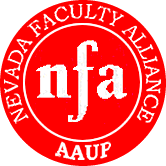Tuesday UNLV President Smatresk announced that he had taken the first formal steps towards a declaration of financial exigency. The key step involved convening the Faculty Advisory Committee specified in UNLV by-laws to consider and report to the Chancellor and Board on whether conditions of exigency exist and on potential steps that might be taken to avert exigency. (This consists of the Faculty Senate executive committee and chair of the Fiscal Affairs committee). At such a time as the Board of Regents votes to declare a state of exigency, the UNLV by-laws call for the creation of an Ad Hoc Exigency Committee (composed of administrators appointed by the president and faculty selected by the Senate) to consider an exigency plan.
Exigency is, as a legal concept, not very well defined in either statute or case law. Although there are AAUP red book guidelines (which are rather outdated; I've recently been asked to serve on an AAUP committee to update them), these amount only to recommended best practices. Significantly, many of the provisions in the AAUP recommendations are codified in the UNLV by-laws (Article 19). In Nevada, the Board is guided not by case law precedent but by the NSHE Code (title II, chapter 5.4.5 and subseq). I've written a brief discussion of what this might mean here.
Exigency is also an exceedingly rare development, especially for a large public university. To the best of my knowledge, UNLV is the only major public university in the United States now preparing for a declaration of exigency.
In the meantime, to begin preparation of what could become an exigency plan, Provost and Executive Vice-President Bowers also distributed to division vice-presidents and to academic deans the budget reduction targets they will be expected to meet if the Governor's budget is implemented. For academic affairs, this would amount, according to the report issued today, to over $25 million, distributed proportionally among the Colleges. (How the figure of $25 million, or over 80% of the total net cut target, was reached was not explained today).
The shares are based on the proportion of state dollars that are allocated to each unit of academic affairs in the current budget. The largest share of that $25 million will fall to Liberal Arts, which will have to meet a reduction target of $3.8 million -- approximately 40 positions. Overall, this level of cut would require elimination of at least 300 total state-funded positions at UNLV (on top of the more than 400 that have already been cut over the past three years.)
He also announced a hiring freeze for all but mission-critical positions and all academic faculty searches are to be "tabled" until at least the completion of the financial exigency plan and, more likely, until the closing of the legislative budget and the implementation of it by the Board of Regents.
Deans are to report back to the Provost with their proposed reductions by next Friday. Faculty in every college ought therefore to be, in the immediate future, providing input to their Deans on how reorganization might be enacted and what other potential cost reductions should be part of their respective college plan.
An omnibus plan will then be prepared for such a time as the Board of Regents requests the plan. The plan will, we were told, be based upon a series of presumptions -- including the enactment of the executive budget as proposed by Gov Sandoval, the addition of all potential tuition and fee monies, County property tax revenue, the proposed 5% salary cut for all faculty and staff, no savings at the System level (ie proportional cut for each institution) -- and most significantly, a declaration of exigency by the Board and the suspension of all by-laws, contracts and protections other than those identified in II.5.4.5 and 5.4.6 of the Code and Article 19 of the UNLV by-laws. Under this scenario, tenure would not be honored, and faculty and staff could be -- and, the General Counsel clarified, likely would be -- terminated with only 60 days notice.
(Note that none of these presumptions are certain and some may even be unlikely. There will certainly be occasion to discuss each and every one in the next few weeks and months.)
Smatresk referred to this scenario as the "financial collapse" of UNLV. He also made clear that he is of the view that this scenario is likely to be enacted, mitigated only to a very small degree by state legislative action. He believes that this degree of wholesale "reform" will be expected of every institution in the System.
There are many, many questions that will have to be addressed between now and then but its quite clear that we are entering unchartered waters on several fronts. We may learn more from tomorrow's Education Committee hearing where Chancellor Klaich is to testify and, one expects, indicate how Smatresk's announcement fits into the System's budget planning process.
For more information about today's events and what they might mean, there are several posts on the UNLV NFA chapter blog and stories have already appeared on the LV Sun and LVRJ websites.
In the meantime, I would be interested in any initial thoughts from among members on how we should respond to this development and what may follow.
In solidarity,
Professor, Department of History, UNLV
President, UNLV Faculty Alliance
Vice-President, Nevada Faculty Alliance
Co-chair, NFA PAC
http://unlvfaculty.blogspot.com
unlvfaculty@gmail.com






For the benefit of readers who may not be familiar with UNLV bylaw 19.4, there is need for a minor correction above.
ReplyDeleteThe Faculty Advisory Committee members include the Chair of the Faculty Senate Professional Staff Committee, and the Chair of the Faculty Senate Priority and New Program Committee, in addition to the Executive Committee of Faculty Senate.
Thank you, Greg, for keeping the campus informed!